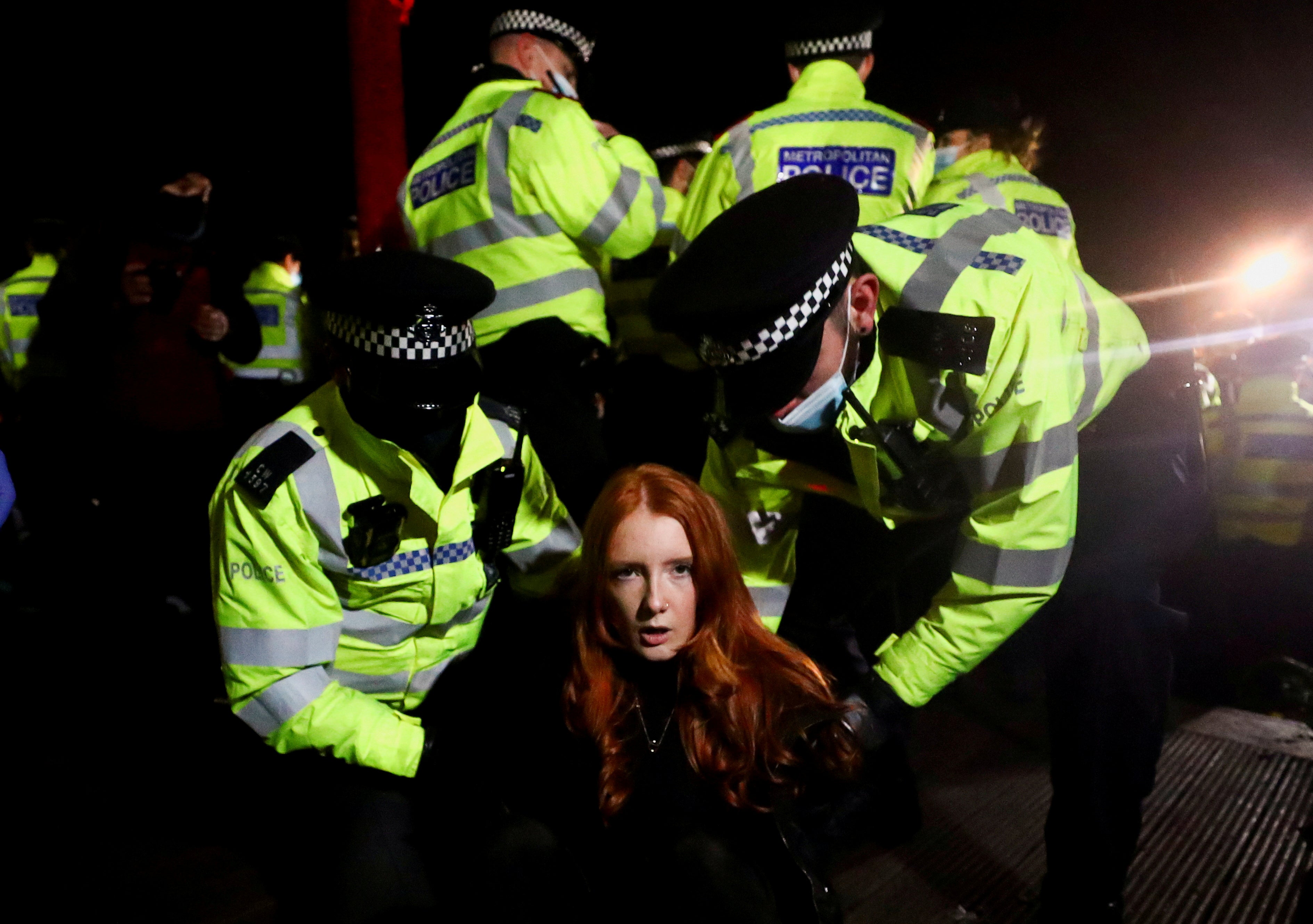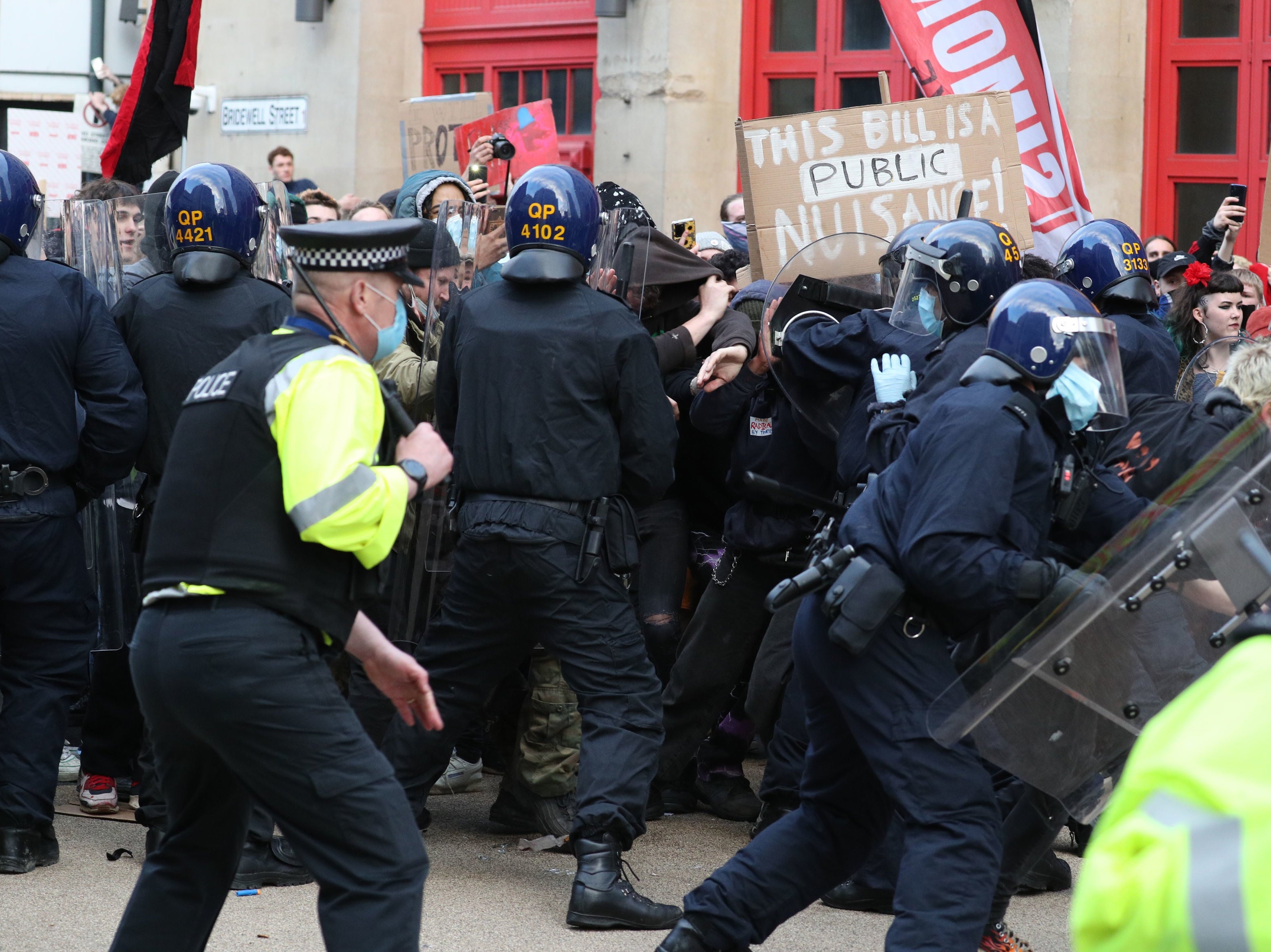Police breached fundamental rights at Sarah Everard vigil and Bristol protests, inquiry finds
Police ‘failed to understand their legal duties’ and used excessive force, MPs find
Your support helps us to tell the story
From reproductive rights to climate change to Big Tech, The Independent is on the ground when the story is developing. Whether it's investigating the financials of Elon Musk's pro-Trump PAC or producing our latest documentary, 'The A Word', which shines a light on the American women fighting for reproductive rights, we know how important it is to parse out the facts from the messaging.
At such a critical moment in US history, we need reporters on the ground. Your donation allows us to keep sending journalists to speak to both sides of the story.
The Independent is trusted by Americans across the entire political spectrum. And unlike many other quality news outlets, we choose not to lock Americans out of our reporting and analysis with paywalls. We believe quality journalism should be available to everyone, paid for by those who can afford it.
Your support makes all the difference.Police breached fundamental rights at the Sarah Everard vigil and demonstrations against controversial protest laws in Bristol, a parliamentary inquiry has found.
Officers misinterpreted coronavirus laws to apply a “presumption of illegality” to the events in March, antagonised protesters and used excessive force, said a report published on Thursday.
It found that following a “kill the bill” protest that descended into violence and vandalism in Bristol, male police officers gained entry into two young women’s homes while disguised as postal workers – before realising they had been wrongly identified as suspects and were innocent.
One of the women, a student, was handcuffed while partially undressed and having a panic attack, while the other was threatened with multiple Tasers.
The All Party Parliamentary Group (APPG) on Democracy and the Constitution said police had been put in a difficult position ahead of the process by the “ambiguity” of Covid restrictions at the time, which neither explicitly permitted nor explicitly banned protest.
But it found that both forces involved, the Metropolitan Police and Avon and Somerset Constabulary, “failed to understand their legal duties in respect of protest” or to “conduct a proper assessment of the proportionality of their actions”.
The APPG became the latest parliamentary group to condemn controversial protest laws proposed in the Police, Crime, Sentencing and Courts Bill.
It said seven clauses should be removed from the law because they “unnecessarily expand police powers over peaceful protest, create excessive legal ambiguity, and are a recipe for the arbitrary use of power”.
They included the ability to impose restrictions on assemblies based on noise, or ban protests by a single person, as well as the creation of a criminal offence of “public nuisance” and lowering the bar for prosecuting people who violate conditions.
Geraint Davies, the chair of the APPG, said the Everard vigil and Bristol protests showed that the “law must be clear that the police have a duty to facilitate the right to peaceful protest”.
“The police must not become the enforcement agency of the state against those who choose to publicly and collectively call for change – political, economic, social or environmental,” he added.
“Parliament must protect our freedoms and reject attempts to increase police power and restrict our right to peaceful protest. The police should help to facilitate the expression of peaceful protest and not drive opposition underground.”
The inquiry took a starkly different position from previous reports by the national policing watchdog, which found that new protest powers were justified and Scotland Yard had acted appropriately at the Sarah Everard vigil.
The APPG said it could not “give full weight” to HM Inspectorate of Constabulary’s report on the vigil because it did not take account of testimonies from attendees.
The inquiry found Scotland Yard engaged with both organisers and attendees “in an antagonistic manner”, releasing a press statement saying the 13 March vigil would be unlawful while talks with organisers were ongoing.
The group that originally organised the vigil, Reclaim These Streets, withdrew after members were threatened with £10,000 fines and prosecution.
“What could have been an organised, Covid-safe event was, as a result, an ad hoc gathering in an already antagonistic situation,” the APPG report said.
“The Metropolitan Police increased the risk to both officers and civilians.”

Members criticised the decision to start ordering attendees to leave and making arrests, which sparked viral images of male officers holding women to the ground and carrying them away.
They found the situation had been “created by the earlier failure to engage productively with organisers” and that although officers were verbally abused, the handling of the event had “caused escalation”.
Attendees told the inquiry the vigil was already beginning to break up when police started ordering people to disperse at around 6.30pm, but that people decided to stay when “male police officers forced their way to the bandstand and ordered the speakers on it to go home”.
“On several occasions the force used by officers against attendees was not proportionate,” the report added.
“Witnesses describe officers throwing women to the ground and holding them down.”
It found that Avon and Somerset Police had also contributed to an “atmosphere of antagonism” before a demonstration against proposed protest laws on 21 March.
Protesters told the inquiry that a sit-down protest outside Bridewell Police Station had been generally peaceful before an “isolated incident” involving two aggressive individuals.

“Police subsequently attacked protestors with pepper spray and beat individuals who were sitting on the ground,” the report said.
“More than 60 attendees were subsequently injured. Police claim that protestors threw missiles, smashed windows at Bridewell Police Station and set several police vehicles alight. It is not clear who struck first.”
The APPG concluded that some force was justified but police had “failed to distinguish between violent and peaceful protestors”, and had wrongly used force against journalists.
It said that the operation involving officers posing as postal workers days later “raises serious questions about police behaviour, sensitivity, and accountability”.
Avon and Somerset Constabulary said it “strongly refutes” some of the report's findings and that when it attempted to engage with organisers no-one identified themselves.
It added: “We remain in the middle of one of the largest investigations ever carried out by Avon and Somerset Police, after police vehicles were damaged and set alight, officers were assaulted and our neighbourhood police station was vandalised during a riot. So far we’ve made 69 arrests with 21 people charged.”
Assistant Commissioner Louisa Rolfe, of the Metropolitan Police, said officers “demosntrated patience and restraint” at the Sara Everard vigil.
“I stand by the actions of those officers who policed the events on Clapham Common,“ she added. ”Those officers were met with an extraordinarily challenging circumstance and demonstrated the highest degree of professionalism in their engagement with those gathering.“
A government spokesperson defended the proposed new laws, and said they would enable police to “better manage demonstrations”.
“The right to protest is a cornerstone of our democracy and our proposed measures in no way curtail the right to peaceful protest,” a statement added.





Join our commenting forum
Join thought-provoking conversations, follow other Independent readers and see their replies
Comments